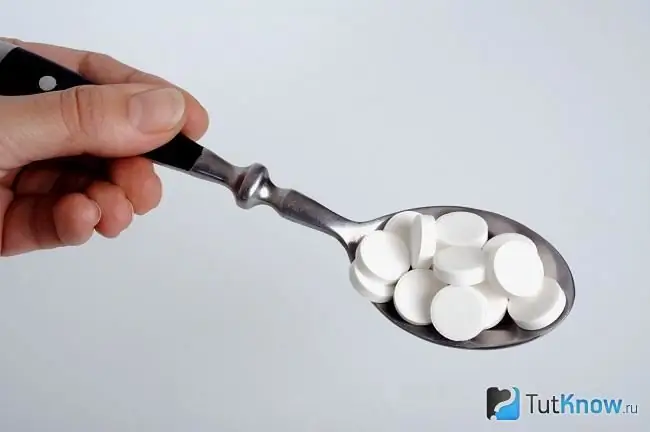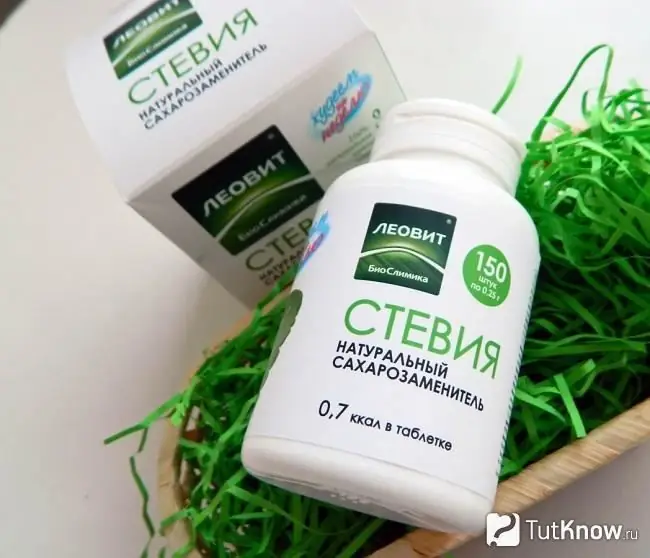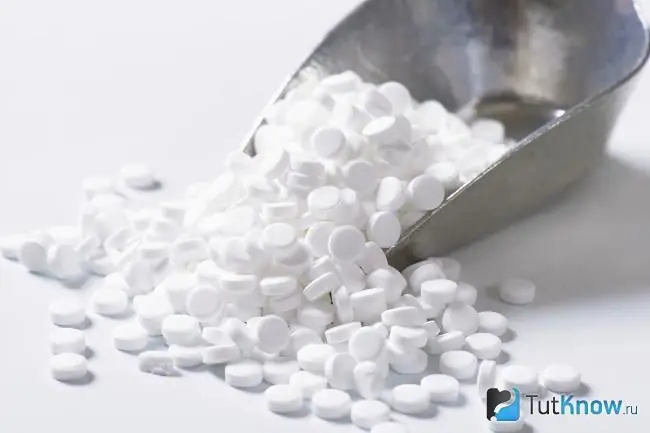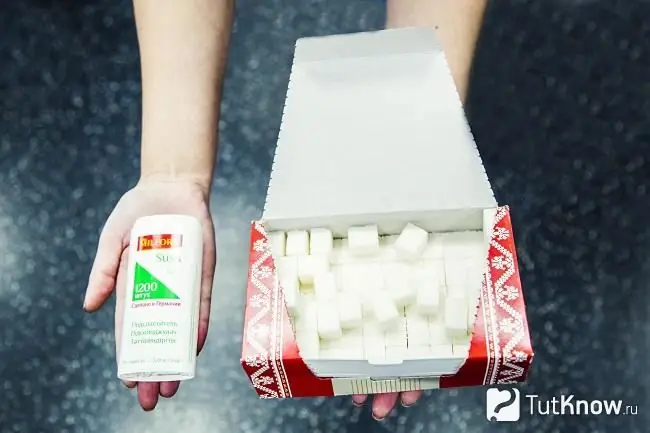- Author Arianna Cook cook@women-community.com.
- Public 2024-01-12 17:55.
- Last modified 2025-01-23 09:40.
Find out if diabetes medications can be used if you are on a tough dryer. Sweeteners appeared many years ago, but there is still no exact answer to the question - what is more, harm or benefit for losing weight from sweeteners. People with diabetes often use these supplements to consume their favorite foods with a familiar flavor. They often remember them during weight loss. Today we will try to find out whether the harm or benefit for losing weight from sugar substitutes can be obtained by you.
However, first, let's take a quick historical background and get acquainted with the history of the emergence of these supplements. To do this, you have to travel back to 1878, when a chemist made a discovery by accident. After working in his laboratory, he did not wash his hands and noticed a sweet aftertaste that did not come from food.
It is quite obvious that he was not up to the continuation of the meal, and he went to his test tubes to confirm his assumption. So saccharin was born, which helped people well during the war years, because then many had only to dream of sugar. Today, many sugar substitutes have been created, the benefits or harms of losing weight are vigorously discussed.
Why do people love sweets and how to overcome addiction?

Let's first try to figure out why people love sweets so much. It turns out that everything is quite simple and everyone gets used to sugar almost from birth. The fact is that breast milk contains about four percent of lactose or milk sugar. Psychologists are sure that for this reason, sweet taste is associated with positive emotions in each of us. This is the reason people love sugar all their lives.
However, among psychologists there is such a thing as sugar addiction. It should be noted that this is a very serious eating disorder that can lead to diabetes and obesity. That is why many people are interested not only in the harm or benefit for losing weight from sugar substitutes can be obtained, but also how to get rid of addiction to sugar.
Lactose is safe for the baby's body, but this cannot be said about ordinary sugar. Here are just a few of the negative properties of sugar:
- The acidity in the oral cavity changes, which leads to the development of caries.
- The process of assimilation of vitamin C slows down.
- The processes of calcium utilization are accelerated, and this leads to the destruction of bone tissue.
- It is one of the main reasons for the development of serious diseases.
If you like to sprinkle sugar on fruits, then this habit should be abandoned, because most of the nutrients have already been destroyed. In practice, sugar is a much more dangerous substance and, in fact, our body does not need it at all. Sometimes you can find the statement that sugar helps to improve the functioning of the brain. It is due to the fact that the brain needs glucose, but this substance can be synthesized from amines or slow carbohydrates. It's time to end the conversation about sugar, because the topic of our article is different - harm or benefit for losing weight from sugar substitutes can be obtained.
Sweeteners - what are they?

It must be said right away that sweeteners and sweeteners are different concepts and should not be confused. In terms of sweetness, sweeteners are as close as possible to sugar and have a certain indicator of energy value. In turn, sweeteners can be thousands of times sweeter than sugar and are completely devoid of calories.
However, today we will not talk about these supplements separately, because the main task is to determine the harm or benefit for losing weight from sugar substitutes that you can get. To do this, it will be necessary to understand their effect on our body. All these additives can be divided into dangerous and, accordingly, safe for our body.
Safe sweeteners

This group of additives, in contrast to popular belief, includes not only natural substances, but also synthetic ones. Safe sweeteners include those additives that cannot cause any pathologies and are not carcinogens or toxins. Let's start with natural sweeteners:
- Stevia - this substance is natural, and in terms of sweetness it surpasses sugar by 200 times. It is made from the leaves of the plant of the same name that grows in South America. It is considered the safest sugar substitute, but we'll talk about that later.
- Neogrespedin - three thousand sweeter than sugar, but the cost of the additive is extremely high.
- Liquorice or gricerizin - a fairly good sweetener, the main disadvantage of which is an unpleasant odor.
- Thaumatin - for the production of the additive, one of the fruits growing in South America is used, but the cost of the technology is high and the additive is practically not used in industry.
- Sorbitol - a natural substance, in large doses it is a laxative.
Let's take a look at synthetic sweeteners that can be safe as well. Actually, only sucralose can be considered as such, which is five hundred times sweeter than sugar. Due to its zero energy value, it is actively used in the production of sports food.
However, due to the high cost, only well-known brands can use sucralose. One kilo of sucralose costs on average about $ 80. Agree, not every manufacturer can afford to use this substance. By the way, the situation is similar with stevia, the cost of which is also quite high.
Hazardous sweeteners

This group includes those substances that pose a danger to the body and sometimes serious. When using these substances, the development of various diseases, including oncological ones, is possible.
- Aspartame. Perhaps it is aspartame that is the most dangerous of all sugar substitutes. The substance is characterized by low resistance to temperature effects. Already after heating to a temperature slightly above 40 degrees, aspartame begins to decompose into several substances, one of which is methyl alcohol. Everyone knows about this substance and we will not now list all its negative effects again. Thus, if you add aspartame to dishes whose temperature exceeds 40 degrees, then you risk becoming a victim of the effects of methyl alcohol on the body. Pay attention to the labels of all products that may contain sweeteners. This is especially true for those that need to be heated. The technology for producing aspartame is very cheap, which makes it very tempting for food manufacturers.
- Saccharin. Remember, at the beginning of the article, we told the story of the discovery of this substance, which is the first sugar substitute. This substance becomes toxic not only under the influence of temperature, but also under the influence of acids. In any acidic environment, for example, juice, a toxic compound imido-group is separated from the saccharin molecule, which is a powerful carcinogen.
- Cyclamate. This sweetener is about 30 times sweeter than sugar, but shouldn't be consumed. There have been many studies that have proven the danger to the body. In the intestinal tract, cyclomat is converted into a strong toxin - cyclohexane.
- Acesulfame potassium. The additive is two hundred times sweeter than sugar and is often used in the food industry. Pay attention to product labels, and if you come across this substance in the list of ingredients, then you should refuse to purchase it.
Harm or benefit for losing weight from sugar substitutes: myths

Most people who actively use sweeteners are sure that these substances have a zero energy value, and are also insulin resistant, or, more simply, insensitive to the effects of insulin. Probably, we will now upset many, but any sugar substitute causes an acceleration of the processes of insulin synthesis.
We do not want to be unfounded in our statements and turn to the results of scientific research. On the territory of Germany in 1988, an experiment was conducted, during which the subjects drank a glass of water with a sweetener dissolved in it on an empty stomach. The sugar concentration was measured before and after drinking water and after 10 or 15 minutes it was found that the sugar level had decreased. This eloquently suggests that sweeteners can affect the work of the pancreas.
Since today we are talking about the possible harm or benefits of sugar substitutes for losing weight, we should understand the processes that take place in the body after consuming sweeteners. We already know that sugar substitutes still affect the process of insulin synthesis.
This is due to the fact that receptors are located in the oral cavity that respond to the sweet taste of food. As soon as you start eating something sweet, receptors instantly send a signal to the brain, after which the process of insulin production starts.
The situation is even worse if you add the sweetener not to tea (coffee), but, say, oatmeal. We know that oatmeal contains slow carbohydrates and cannot stop us from losing weight. However, when porridge is combined with a sweetener, the body reacts precisely to the second substance. As a result, you are sure that you have given up sugar, but in practice this is not at all the case. You yourself, without knowing it, are substituting simple carbohydrates for complex carbohydrates. In conclusion, it should be said that the harm or benefit for losing weight from sugar substitutes or other food products primarily depends on your sanity.
For more information on the benefits and dangers of sweeteners, see below:






